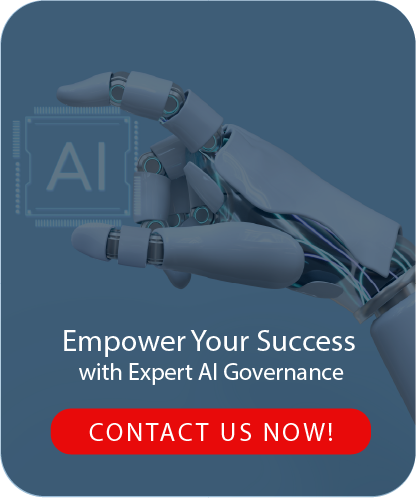In today's tech world, ai governance software is key for companies. It helps them use artificial intelligence responsibly and follow rules. These tools manage AI activities company-wide, helping businesses stay on track with AI rules.
Using strong ai governance software is more than just being efficient. It's about building trust and avoiding risks. Research shows that using ethical AI can cut down on risks by 30% and boost trust by 50% in just a year. This shows how important good AI governance is for a company's reputation and success.
The AI world and rules are always changing. Now, over 70% of compliance officers see AI governance as vital for following new rules, like the EU AI Act. By managing AI projects well, companies can follow rules better, showing the value of good governance.
AI governance is not just about following rules. It affects how a business works and innovates. Companies that manage their AI well can make decisions faster, leading more efficient projects. This, along with saving on long-term compliance costs, makes investing in AI governance a smart move.

Key Takeaways
- AI governance software reduces compliance risks.
- Stakeholder trust can improve by within a year of implementation
- Most of compliance officers view AI governance as critical for regulatory compliance
- Centralized AI governance can boost policy compliance rates
- Active AI governance can increase project efficiency
- Long-term compliance costs may decrease with proper AI governance
Understanding AI Governance Software and Its Critical Role
AI governance software is key in today's business world. It helps companies deal with the complex AI landscape. It ensures they follow rules and act ethically. As AI use grows, so does the need for strong governance.
The Evolution of AI Governance Platforms
AI governance platforms have grown from basic risk tools to full solutions. They handle today's AI challenges like data privacy and bias. This shows how vital trustworthy AI practices are in business.
Key Components of Modern AI Governance Solutions
Today's ai compliance tools have several important parts:
- Risk assessment frameworks
- Compliance monitoring tools
- Ethical AI guidelines
- Model performance tracking
These parts form a strong governance system. They let companies innovate responsibly and keep high ethical standards.
Building Trust Through Automated Oversight
Automated oversight boosts trust among stakeholders. This includes customers, regulators, and employees. AI governance software keeps a close eye and reports regularly. This ensures AI operations are transparent and accountable.
This approach helps companies stick to ethical standards and follow laws like GDPR and the OECD AI Principles.
| AI Governance Benefit | Impact |
|---|---|
| Risk Reduction | Decreased financial, legal, and reputational risks |
| Compliance Assurance | Adherence to AI-related regulations and standards |
| Ethical AI Development | Promotion of fairness and transparency in AI systems |
| Stakeholder Confidence | Increased trust from customers, employees, and partners |

Essential Features of Effective AI Risk Management
AI risk management is key to protecting companies from AI's dangers. Good systems have important features to handle AI risks well.
A central project management hub is crucial. It lets companies manage all AI tasks from one place. This ensures everything runs smoothly and under control. Also, it helps follow AI rules, which is important since most of companies face AI compliance issues every year.
AI transparency platforms are also vital. They help explain AI's actions and decisions clearly to everyone. Since most of AI project failures are due to poor communication, these platforms are key for trust and responsibility.
Advanced analytics are needed to spot AI biases. Studies show regular bias checks can cut fairness problems. Tools that watch AI in real-time help fix issues fast.
Finally, strong reporting tools are important for keeping stakeholders informed. This is crucial as 60% of board members think their companies don't follow all AI rules. With these features, companies can improve their AI risk management a lot.
AI Governance Software: Implementation and Integration Strategies
Getting AI governance software right is key. It's about making sure it fits well with how your company works. With AI making $118.6 billion by 2025, good governance is more important than ever.
Centralizing AI Project Management and Oversight
Putting AI projects under one roof is essential. AI governance software helps by offering a single place for tracking and managing projects. This way, you avoid the problem of AI projects working in isolation.
Streamlining Compliance Workflows
AI compliance tools make following rules easier. Over 14,000 companies use them to stay on top of laws. They help by using legal advice from around the world, keeping up with rules like the EU AI Act.
Establishing Transparent Documentation Systems
AI transparency platforms are crucial for keeping records straight. They help deal with data problems that can mess up AI. Good documentation means better data and smoother processes.
Creating Model Cards and Audit Trails
Model cards and audit trails are key parts of AI governance software. They give out the details on AI models and how they work. This makes sure everyone knows who's responsible for AI's effects.
| Implementation Strategy | Key Benefit | Challenge Addressed |
|---|---|---|
| Centralized Project Management | Consistent control across AI initiatives | Siloed AI development |
| Automated Compliance Workflows | Efficient regulatory adherence | Complex legal requirements |
| Transparent Documentation | Enhanced data quality and traceability | Data preparation complexities |
| Model Cards and Audit Trails | Increased accountability | Lack of AI system transparency |

Maximizing ROI Through Ethical AI Frameworks
Ethical AI frameworks are changing the game for businesses looking to boost their return on investment (ROI). By using trustworthy AI practices, companies are seeing big wins in different areas. For example, a top bank used explainable AI for credit scoring. This cut down false negatives by 20% and boosted approved loans for underprivileged groups by 15%.
Ethical AI is making waves beyond finance. In healthcare, a hospital network's AI framework improved how they use resources by 30%. It also cut patient wait times by 25%. These changes not only make things run smoother but also make patients happier and healthier. An auto maker also used explainable AI in quality control. This move cut down defects by 40% and made it easier to track AI-driven decisions.
Companies using ethical AI are beating their rivals, especially in finance and healthcare. Those with solid AI plans see up to 30% more productivity. This is because AI efforts are better aligned with business goals. Better data management boosts AI model accuracy by 50%. And, focusing on AI governance can cut down bias and transparency risks by 20%.
The advantages of ethical AI frameworks are obvious. They build trust, avoid bias, and help follow rules. By embracing these practices, businesses can see better efficiency, more customer trust, and lower legal risks. As AI keeps growing, ethical frameworks will be key in driving innovation and keeping standards high.
Why Partner with Vinali Advisory for AI Governance Software?
Navigating the complexities of AI governance requires more than just software it demands strategic expertise and a deep understanding of ethical innovation. At Vinali Advisory, we specialize in tailoring AI governance solutions that align with your business objectives while ensuring full compliance.
Our team brings a wealth of experience in AI ethics, risk management, and compliance frameworks, helping you not only mitigate risks but also unlock the full potential of responsible AI innovation. By partnering with Vinali Advisory, you gain a trusted ally committed to fostering transparency, building stakeholder trust, and driving sustainable growth through ethical AI practices.
Ready to elevate your AI governance strategy? Contact Vinali Advisory today!
SOURCE LINKS
AI Governance In 2025: Expert Predictions On Ethics, Tech, And Law
FAQ
What is AI governance software?
AI governance software helps manage and control AI systems. It includes tools for risk assessment and ethical AI. This ensures AI projects meet legal standards and company values.
Why is AI governance important for businesses?
AI governance is key for businesses. It reduces AI risks, ensures legal compliance, and builds trust. It allows for responsible innovation and ethical AI use.
What are the key components of AI governance software?
AI governance software has several key parts. These include risk assessment, compliance tools, and ethical guidelines. It also has automated oversight and transparent documentation systems.
How does AI governance software help with risk management?
AI governance software helps manage risks. It uses advanced analytics to spot biases in AI models. It also tracks AI performance and offers transparent reports.
What are AI transparency platforms?
AI transparency platforms are tools in AI governance software. They help explain AI processes and decisions to stakeholders. This builds trust and accountability.
How can organizations implement AI governance software effectively?
To implement AI governance software well, centralize AI management. Streamline compliance and use transparent documentation. Focus on overcoming integration challenges and learn from successful cases.
What are ethical AI frameworks?
Ethical AI frameworks guide AI development and deployment. They ensure AI systems are fair, transparent, and respect human rights. These frameworks are part of AI governance software.
How do ethical AI practices contribute to ROI?
Ethical AI practices improve brand reputation and customer trust. They reduce legal risks and create reliable AI systems. This leads to better business outcomes and sustainability.
What are model cards in AI governance?
Model cards document AI models' details. They include purpose, performance, limitations, and biases. Model cards enhance transparency and support responsible AI use.
How does AI governance software help with regulatory compliance?
AI governance software aids in regulatory compliance. It automates workflows and keeps up with regulations. It also monitors and reports on AI system compliance, reducing non-compliance risks.






